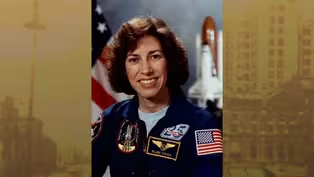
UN reaches historic deal to protect ocean biodiversity
Clip: 3/5/2023 | 6m 45sVideo has Closed Captions
Historic deal to protect ocean biodiversity reached at UN conference
Delegates at the United Nations have agreed on a historic international treaty to protect biodiversity on the high seas, a deal years in the making. The agreement is critical to reaching another U.N. goal: protecting 30 percent of the ocean by 2030. Liz Karan with the Pew Charitable Trusts joins John Yang to discuss the negotiations.
Problems playing video? | Closed Captioning Feedback
Problems playing video? | Closed Captioning Feedback
Major corporate funding for the PBS News Hour is provided by BDO, BNSF, Consumer Cellular, American Cruise Lines, and Raymond James. Funding for the PBS NewsHour Weekend is provided by...

UN reaches historic deal to protect ocean biodiversity
Clip: 3/5/2023 | 6m 45sVideo has Closed Captions
Delegates at the United Nations have agreed on a historic international treaty to protect biodiversity on the high seas, a deal years in the making. The agreement is critical to reaching another U.N. goal: protecting 30 percent of the ocean by 2030. Liz Karan with the Pew Charitable Trusts joins John Yang to discuss the negotiations.
Problems playing video? | Closed Captioning Feedback
How to Watch PBS News Hour
PBS News Hour is available to stream on pbs.org and the free PBS App, available on iPhone, Apple TV, Android TV, Android smartphones, Amazon Fire TV, Amazon Fire Tablet, Roku, Samsung Smart TV, and Vizio.
Providing Support for PBS.org
Learn Moreabout PBS online sponsorshipJOHN YANG: Good evening, I'm John Yang.
Delegates at the United Nations have agreed on a historic international treaty to protect biodiversity in the ocean.
It's been years in the making and only made it over the finish line after a marathon 36-hour negotiating session that ended late last night.
Even for people who don't live near it, the ocean is central to life on Earth.
It covers more than 70 percent of the Earth's surface, is home to tens of thousands of fish species, provides oxygen for the planet and provides the livelihood for billions of people.
But only 1.2 percent of the ocean has any legal protection, leaving the high seas lawless and ripe for exploitation.
Overfishing threatens biodiversity.
Another threat, the oceans rising temperatures caused in part by climate change, and the manmade scourge of plastic pollution poses an ever growing problem.
Late last month as the United Nations kicked off a fifth round of negotiations to establish a treaty to protect more of the ocean.
The cause gained some starpower.
JANE FONDA, Actor and Activist: We depend on the ocean.
Even dogs don't poop in their kennel because they know that the kennel provides security and a home for them.
We're pooping in our kennel.
We're supposed to be so smart.
We're destroying things we don't even understand.
JOHN YANG: The outcome is critical to reaching another UN goal protecting 30 percent of the ocean by 2030.
Over the past two weeks, delegates from 193 countries met to try to hammer out the final details of a treaty.
Among the goals creating a legal framework to establish a network of high sea marine protected areas, creating rules for exploitation of resources and confronting the issue of overfishing.
RANA LEE, UN Ambassador for Oceans and Law of the Sea Issues: The ship has reached the shore.
JOHN YANG: Late last night after 36 straight hours of negotiations with the United Nations, the president of the conference announced the historic agreement.
Earlier I spoke with Liz Karan, who was at the UN for those negotiations as head of the Pew Charitable Trusts efforts to protect ocean Life on the high seas.
I asked her about the final push to get the deal done.
LIZ KARAN, The Pew Charitable Trusts: It was truly incredible.
The negotiations started even before the official starting time of 10 a.m. on Friday morning and went all through the night into the next morning and didn't conclude almost 10 p.m. the next day.
So, you know, it's not unusual for negotiations this kind to go into a little bit of overtime but this was really an incredible situation where I think because of the complexity of package, issues being dealt with, and negotiators really needed that extra time to push it over the finish line.
JOHN YANG: Given the complexity, given how long this has been in the works, and how long these final round of talks were, how much of the significance of this agreement is in the details of the provisions?
And how much is it the fact that it exists, that countries were able to come to an agreement at all?
LIZ KARAN: Given where the situation in the world today, I think that it's historic that we are able to have a multilateral agreement of this scale that covers to the high seas, which covers two thirds of the world's ocean.
It is also an incredibly detailed agreement sets out a legal framework for establishing high seas, marine protected areas and other airbase management tools, sets out standards and a consistent process to evaluate environmental impacts of new activities in the high seas.
And it also sets out financial benefit sharing for derived from marine genetic resources.
And a very important element is ensures capacity building and the transfer of marine technology to ensure the equitable and effective implementation of this agreement.
JOHN YANG: What were the final hurdles are some of the toughest hurdles to clear before the agreement was reached?
LIZ KARAN: I think two key issues one is around that financial benefit sharing of the marine genetic resources, it really is an unprecedented provision, and basically ensures that benefits are derived from the global commons are shared, even by shared globally.
So what that means is that developing countries can also benefit from them, and that those benefits will be in turn used for conservation and sustainable use of the reign of violence.
JOHN YANG: So it sounds like it's some of the same splits that we've seen in climate change talks between the rich industrial nations and the poor nations who feel that they're being asked to pay for what the rich industrial nations have created.
But now, they're looking to get the benefits.
Is that right?
LIZ KARAN: That's true.
Yes, I think financial benefit sharing is an important issue.
It really isn't an issue of equity and allowing for the effective implementation of the agreement.
The agreement will, as I mentioned, set out a process for the establishment of large scale marine protected areas in the high seas.
And that is really important to protect areas, they're going to be key for biodiversity, especially in a changing climate.
JOHN YANG: Now, this still has to be ratified by many of the signatory nations.
Is that right?
LIZ KARAN: It does.
Actually what occurred last night is that the president of the conference, finalize the text that will then be going for technical review and translation into all six UN official languages, which time countries will come back and officially adopted in the near future.
JOHN YANG: And what's next?
I mean, I know that the UN would like to have rules governing 30 percent of the oceans by 2030.
Does this help that?
LIZ KARAN: Absolutely.
The high seas make up two thirds of the world's oceans.
It's over half of the surface area of the planet.
They play a very important role in ensuring the implementation of the 30 by 30 target.
Actually, without this treaty, it can be very hard to meet that target.
JOHN YANG: Liz Karan of the Pew Charitable Trusts.
Thank you very much.
LIZ KARAN: Thank you, John.
The story of Ellen Ochoa, the first Hispanic woman in space
Video has Closed Captions
Clip: 3/5/2023 | 1m 21s | The story of Ellen Ochoa, the first Hispanic woman in space (1m 21s)
Why a type of breast reconstruction may get harder to access
Video has Closed Captions
Clip: 3/5/2023 | 9m 39s | Insurance change raises access concerns about a type of breast reconstruction (9m 39s)
Providing Support for PBS.org
Learn Moreabout PBS online sponsorship
- News and Public Affairs

FRONTLINE is investigative journalism that questions, explains and changes our world.

- News and Public Affairs

Today's top journalists discuss Washington's current political events and public affairs.












Support for PBS provided by:
Major corporate funding for the PBS News Hour is provided by BDO, BNSF, Consumer Cellular, American Cruise Lines, and Raymond James. Funding for the PBS NewsHour Weekend is provided by...

